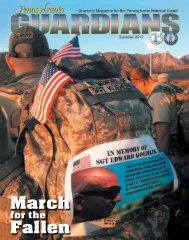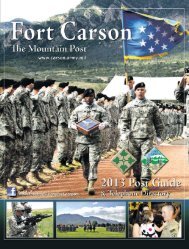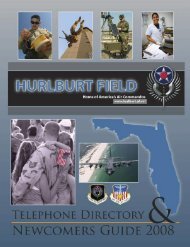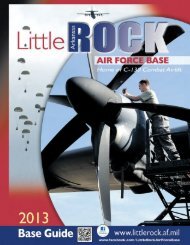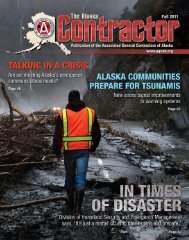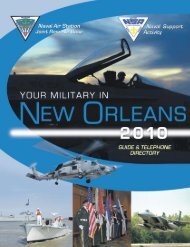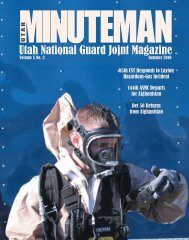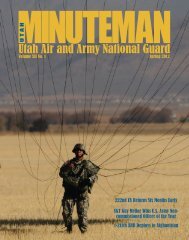New Mexico Minuteman - Winter 2012
New Mexico Minuteman - Winter 2012
New Mexico Minuteman - Winter 2012
You also want an ePaper? Increase the reach of your titles
YUMPU automatically turns print PDFs into web optimized ePapers that Google loves.
Resilience:<br />
strength beyond the uniform<br />
By Staff Sgt. Jason A. Henson, state resiliency coordinator<br />
With our nation being at war for more<br />
than 10 years, the stress on the force is<br />
beginning to show. We are experiencing<br />
increasing rates of substance abuse,<br />
omestic violence, post-traumatic stress disorder,<br />
depression and a whole litany of other<br />
disturbing trends among service members<br />
including increases in suicide rates. With all<br />
of these issues plaguing our Soldiers, the<br />
Department of the Army has founded the<br />
Comprehensive Soldier Fitness program in<br />
an effort to combat this epidemic.<br />
So what exactly is CSF? Simply put,<br />
CFS is a structured, long-term assessment<br />
and developmental program to build the<br />
resilience and enhance the performance of<br />
every Soldier, family member and Department<br />
of the Army civilian. What does this<br />
mean for you and your Soldiers?<br />
Resilience, at its simplest, is a comprehensive<br />
skill set that will enable Soldiers to<br />
thrive in all aspects of their lives by giving<br />
them an increased ability to handle the<br />
stresses of life, whether they are big or small.<br />
Essentially, it is the ability to bounce back<br />
from adversity. The resilience program is<br />
not to be confused with suicide prevention;<br />
however, you can think of the resilience program<br />
as being preventive medicine against<br />
suicide. The basic idea is the more resilient<br />
the individual, the less likely he or she is to<br />
fall into the trap of suicidal thoughts.<br />
So how does it work? In order to build<br />
an individual’s resilience, the resilience<br />
program teaches the Soldier a number of<br />
simple cognitive reasoning skills designed<br />
to increase that individual’s resilience<br />
and overall well-being.<br />
For example, the “hunt the<br />
good stuff” skill teaches<br />
the individual a simple<br />
daily exercise that involves<br />
refl ecting on three good<br />
things that happened in<br />
that person’s life that day<br />
and how he or she can<br />
build upon those successes<br />
to create “winning streaks.” The<br />
premise is that by actively dwelling on<br />
the positive events in our lives, no matter<br />
how big or small, we can gradually build<br />
up a signifi cantly more positive outlook on<br />
life, which in turn, will increase our overall<br />
success and happiness.<br />
Other skills in the program address areas<br />
such as interpersonal communication techniques,<br />
personal strengths, problem solving,<br />
and energy management. However, like<br />
most areas of cognitive reasoning, you only<br />
get out of it what you put in. For the program<br />
to succeed, it is vital that senior offi cers and<br />
noncommissioned offi cers work together to<br />
establish a unit climate that promotes resilience<br />
as a way of life versus another “check<br />
the box” training requirement.<br />
As of October, the R3SP program—<br />
Resilience, Risk Reduction & Suicide Prevention—has<br />
trained 30 resilience training<br />
Assistants and six master resilience trainers.<br />
These individuals are responsible for<br />
conducting the National Guard Bureaumandated<br />
quarterly resilience training in<br />
every unit within the <strong>New</strong> <strong>Mexico</strong> Army<br />
National Guard. Over the course of fi scal<br />
year <strong>2012</strong>, the R3SP program will be conducting<br />
RTA training courses targeted at<br />
any units that do not yet have their own RTA<br />
or MRT. The goal is to have at least one RTA<br />
in every unit/detachment, one MRT in every<br />
battalion headquarters, and two MRTs in<br />
every brigade headquarters. In addition to<br />
the NGB-mandated resilience training, the<br />
R3SP offi ce will also be offering a shorter<br />
resilience training program during unit<br />
annual trainings called “Flash<br />
Forward,” and will develop<br />
a “Resilience for Leaders”<br />
course to be fi elded in<br />
early <strong>2012</strong>. For more<br />
information about the<br />
resilience program or<br />
the suicide prevention<br />
program contact Staff<br />
Sgt. Jason Henson at<br />
jason.henson@us.army.mil<br />
or call 505-474-2162.<br />
BEYOND STRONG<br />
<strong>Winter</strong> <strong>2012</strong> / NEW MEXICO National Guard 23



